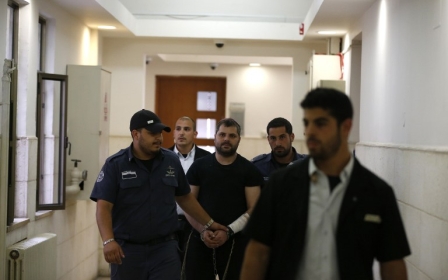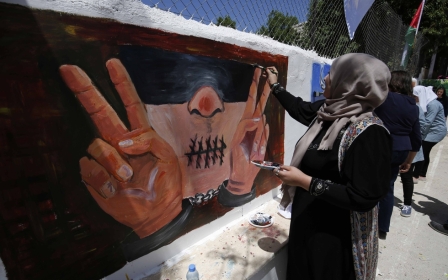Israeli army denies general compared modern Israel to Nazi Germany

The Israeli army deputy chief of staff Yair Golan has backtracked on comments that seemingly compared elements of modern Israel with Nazi Germany.
“I had no intention of making that comparison,” Golan said in a statement on Thursday morning.
In what the Israeli army described as a clarification, a spokesperson who read out the statement said the general "did not intend to compare the IDF [Israeli army] and Israel to what happened in Germany 70 years ago. Such a comparison would be absurd and baseless."
"The IDF is a moral army that respects purity of arms and human dignity,” the spokesperson said, adding there was no intention to criticise the “political echelons”.
Golan, who is the son of Holocaust survivors, made his controversial address on Wednesday evening, a day before Holocaust Remembrance Day.
"If there's something that frightens me about Holocaust remembrance it's the recognition of the revolting processes that occurred in Europe in general, and particularly in Germany, back then – 70, 80 and 90 years ago – and finding signs of them here among us today in 2016,” he said.
The Holocaust "must make us think deeply about the responsibility of leadership, the quality of society, and it must lead us to fundamental thinking about how we, here and now, treat the stranger, the orphan and the widow, and all who are like them."
"There is nothing easier than hating the stranger, nothing easier than to stir fears and intimidate. There is nothing easier than to behave like an animal and to act sanctimoniously," he added.
Golan's apparent backtracking has gone some way to subdue critics.
Justice Minister Ayelet Shaked, of the ultra-nationalist Jewish Home, said that she continued to believe that Golan must have been "confused".
“The deputy IDF commander, in my opinion, was confused,” Shaked told Israel’s Army Radio on Thursday. “His words mainly indicate a lack of understanding, not to mention a contempt for the Holocaust.”
“There is nothing in the world that should be compared to this story [the Holocaust],” she added.
But Naftali Bennett, who heads Jewish Home Party and had initially called on Golan to retract his statements before they could be seized on by Holocaust deniers, has since said that he accepts the clarification.
Others, however, have come out in support of Golan.
Centre-left Zionist Union chairman Isaac Herzog also backed Golan even prior to Thursday's statement calling him a "brave commander".
"Disturbed people who will start shouting now against him ought to know, this is what morality and responsibility sound like,'" Herzog said.
Leftist Meretz leader Zehava Galon also said Golan's comments "reflect the depth of the serious crisis between military commanders and the political echelons who undermine IDF values and encourage militancy".
In his speech, Golan went on to call for Holocaust Remembrance day to be a day of "national atonement [that] ought to include unsettling issues".
“The IDF has always taken pride in its ability to investigate difficult events impartially and to take full responsibility for what is good but also for what is bad and unacceptable… We believe very much in the justice of our path, but not everything we do is just. We trust the IDF's moral standards as an organisation, but we do not ignore individual deviations."
The Golan controversy comes amidst a growing debate about alleged anti-Semitism in Europe.
On Wednesday, the justice minister told the Washington Post that she was deeply fearful of a rise in anti-Semitism in Europe.
“In the past, we saw European leaders speaking against the Jews. Now, we see them speaking against Israel. It is the same anti-Semitism of blood libels, spreading lies, distorting reality and brainwashing people into hating Israel and the Jews,” Shaked told the paper. “We can still witness anti-Semitism today. In fact, the anti-Semitic voices seem to get louder and stronger still."
Middle East Eye propose une couverture et une analyse indépendantes et incomparables du Moyen-Orient, de l’Afrique du Nord et d’autres régions du monde. Pour en savoir plus sur la reprise de ce contenu et les frais qui s’appliquent, veuillez remplir ce formulaire [en anglais]. Pour en savoir plus sur MEE, cliquez ici [en anglais].




